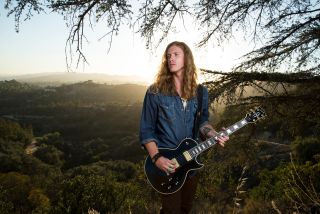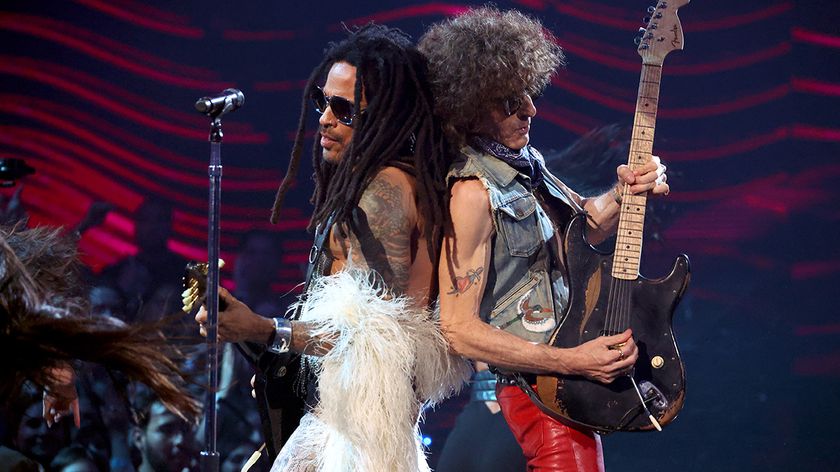Wild Revival: Jared James Nichols Talks New EP and Playing the Blues

Being a great blues guitar player is something you can't teach or absorb through osmosis. Real blues comes from the soul. You've either got it or you don't.
In the case of Jared James Nichols, the former applies.
Sure, the 22-year-old guitarist took a few basic lessons in the beginning (and would eventually do a short stint at Berklee), but Nichols has spent much of the last eight years being locked inside of a room, taking everything he loves about the blues and finding his own voice.
Nichols' new EP, Old Glory & The Wild Revival, sounds like the title of an old Western movie, but it's more about movement. Produced by Warren Huart, whose credits include Aerosmith and the Fray among others, Nichols' EP is a refreshing reminder that the blues comes from within. I spoke with him about the new album, his playing style and gear.
GUITAR WORLD: Why the title Old Glory & The Wild Revival?
"Old Glory" is what I call my Les Paul. It's kind of a mish-mash, crazy-looking old Custom with a '58 body and '68 hardware. I really liked the guitar when I bought it because it was bad ass, all beaten and torn up. It kind of reminded me of the old American flag. It had such a great sound that I decided to use it on the record. Besides a Dobro, I used it for all of the guitar parts. The "wild revival" symbolizes what I want to create with the blues movement. I figured Old Glory and The Wild Revival because that's what's happening.
What was it like working with producer Warren Huart?
Get The Pick Newsletter
All the latest guitar news, interviews, lessons, reviews, deals and more, direct to your inbox!
I met Warren while he was working with Aerosmith at The Swing House, where we recorded the EP. I was at the studio while they were recording and Steven [Tyler] really liked my playing and asked Warren to work with me. Once they were done, Warren approached me about getting together. Not only did he produce the album, but he mixed and co-wrote four of the songs on it as well. We did a lot together.
Tell me the origin of the song "Let You Go".
It started out as an old "Jimmy Reed meets Lightnin' Hopkins" kind of feel. Although it sounds nothing like it, that's where I got that main slinky guitar riff, and it cued the whole song. I started jamming it and Warren said, "Hey, what's that?" So we started talking about the band Free and how amazing Paul Kossoff was. We mixed in a lot of different influences into the song. It was very organic and we didn't over think it. After the main riff, the song pretty much wrote itself.
Why the Flying V and Les Paul as opposed to using the traditional Strat for the blues?
For me, it's always been about trying to sound different. I was attracted to the V not just because some of my heroes like Albert King and Lonnie Mack played them, but also because of the tone. It's really a flat, long piece of mahogany that has this great mid-range bite. I've played Strats forever and got burned out from them. I wanted something different, so I moved to the V [and the Les Paul] to get more of a humbucker sound. Once I did that, I also dropped using the pick as well.
Did you find it difficult dropping the pick?
From a practicing standpoint and having to re-learn licks, it was. But playing without a pick is much more intimate. You can get so many different sounds just from using fingers. It was a weird transition at first, but it also helped me break the rules.
Tell me about your "connection" to Stevie Ray Vaughan.
When I was growing up, I lived right next to Alpine Valley, where he died and a lot of the people I'm related to were actually first responders to the accident. So growing up, it was always apparent to me that he played his last concert there. I still remember when I first heard him play, I thought, "Oh, so THIS is how you play guitar. Now I know exactly what I need to do!"
What's your live setup like?
In a usual club setting, I'll use either the Flying V or Les Paul along with a 2x12 cabinet and 50-watt Blackstar head. I've been using Blackstars for about a year and a half and like to run them like an old Marshall. It's loud and in your face. I've also recently modded the Les Paul so it's almost like a Junior now. It's got just one pickup with one volume and one tone. For pedals, I have T Rex Yellow Drive, which I use for more gain and boost. I also have a Chicago Iron Octavia, which gives me some freaky stuff, along with an Xotic Effects EP Booster. It's the least amount of stuff to get my fingers through the speakers.
You also studied at Berklee. What was it like being a "blues" guy in that "structured" environment?
It was my first time being out and surrounded by amazing players and music. I knew when I got there that I didn't want to be a teacher or one of those guys who knew every mode in every position. I just wanted to be the blues guy and play what I was feeling. I had a hard time trying to play that kind of music. I was definitely feeling the blues, in more ways than one. I already knew what I wanted to do. I just had to get out there and do it.
For more about Jared James Nichols, visit his Facebook page.
James Wood is a writer, musician and self-proclaimed metalhead who maintains his own website, GoJimmyGo.net. His articles and interviews are written on a variety of topics with passion and humor. You can follow him on Twitter @JimEWood.


James is a guitarist and freelance writer who's interviewed some of the biggest names in music. He is the author of four books and his writing credits include work for Guitar World, AXS and Yahoo! as well as for his hometown newspaper where he writes on a variety of topics with both passion and humor. As a guitarist, he's performed everywhere from local bars and nightclubs to some of the biggest stages in front of thousands of music fans.

“We had 15 minutes left, and it was time to go… I just started playing that riff. Then Lenny goes, ‘Whoa, what’s that?’”: Lenny Kravitz guitarist Craig Ross reveals the serendipitous roots of a Kravitz classic

“The concept of the guitar duel at the end was just appalling”: Crossroads is an essential piece of '80s guitar lore, but not every guitar legend was a fan of the film








